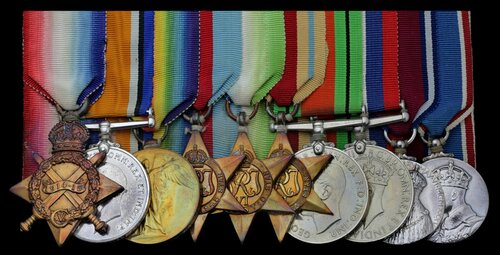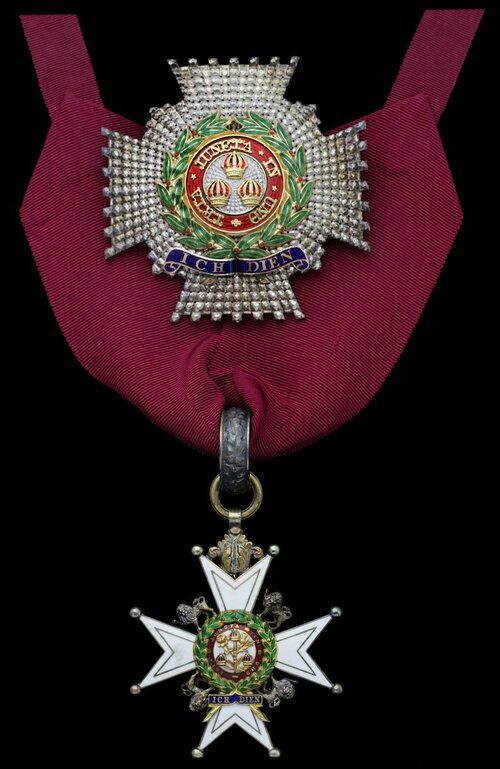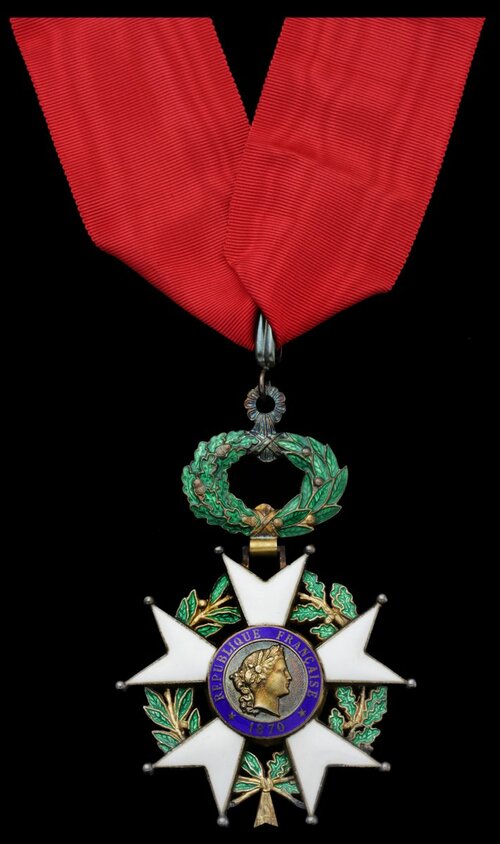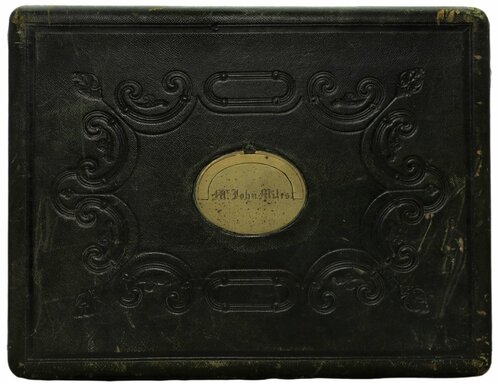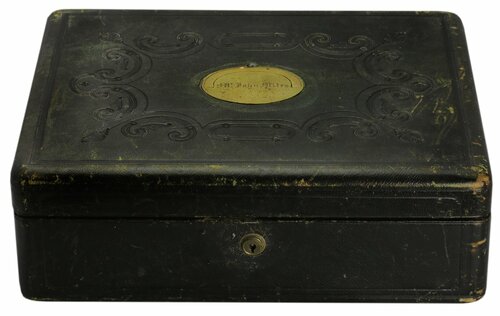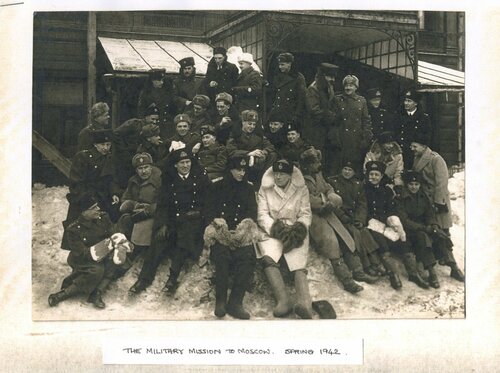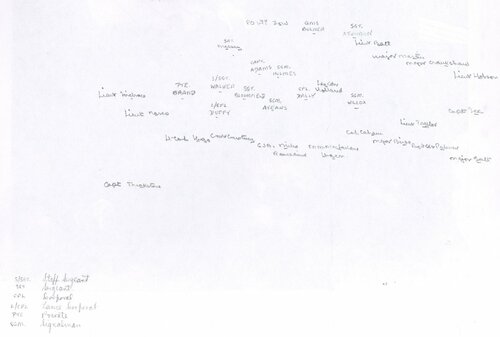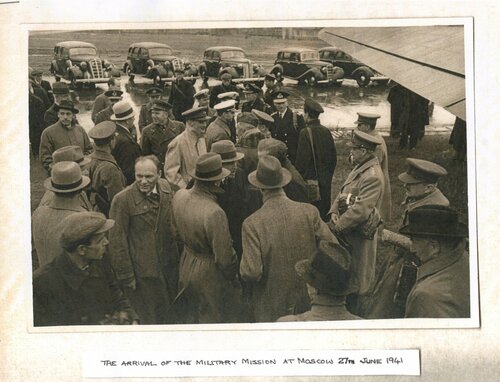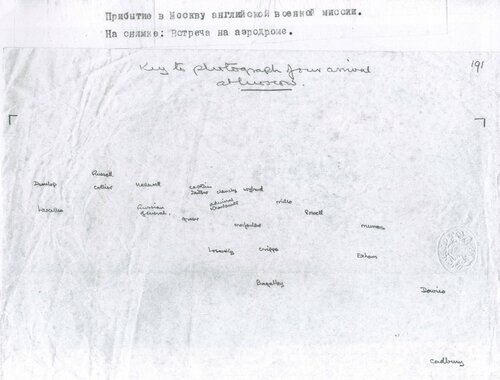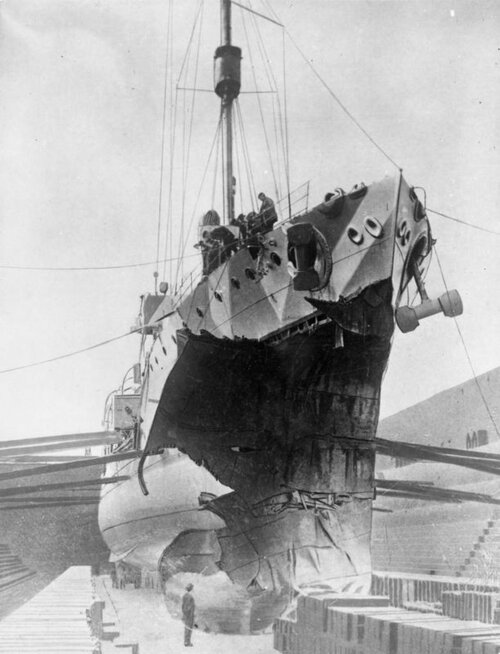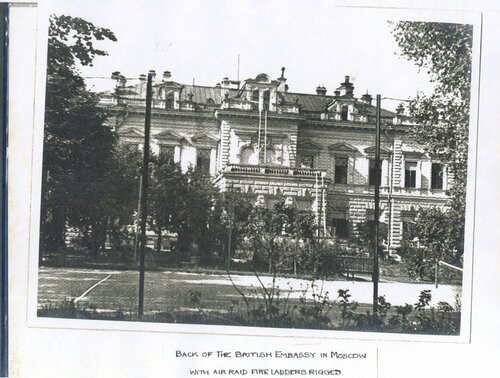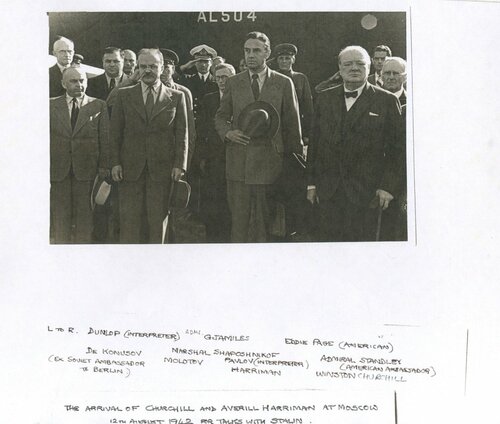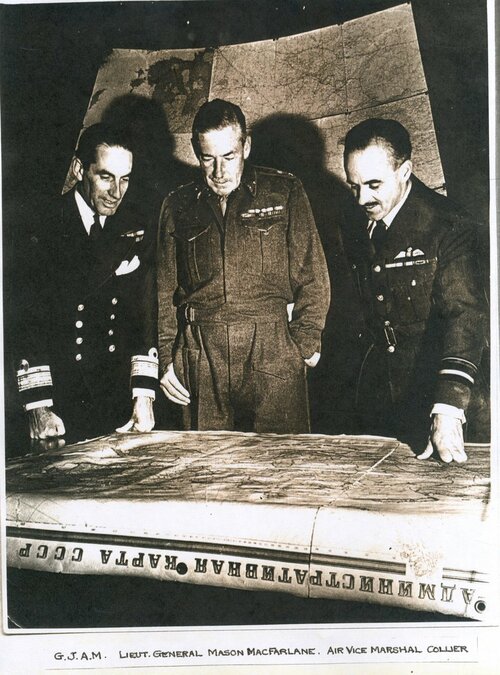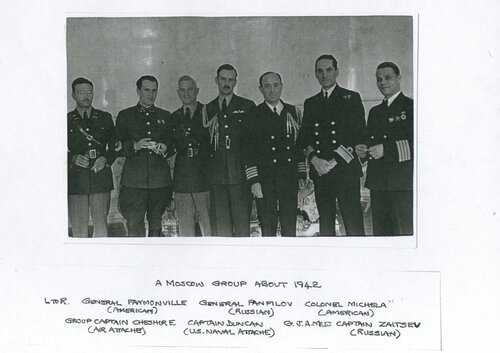Auction: 21001 - Orders, Decorations and Medals (conducted behind closed doors)
Lot: 336
Sold by Order of a Direct Descendant
The important K.C.B., Legion of Honour group of twelve awarded to Admiral Sir G. J. A. Miles, K.C.B., K.C.S.I., Royal Navy
Having joined the Senior Service at the age of fifteen, Midshipman Miles had a career that is surely unique and unrivalled in its range; he saw active service during the Great War and during the Second World War he began with the command of the battleship Nelson
Afterwards he was appointed Head of the Military Mission in Moscow, 1941-43, a fruitful posting which led to Miles being the self-proclaimed 'Senior Representative of the Senior Ally's Senior Service', which saw him sharing banquets, providing his own performance for the members of the Bolshoi when German artillery neared Moscow, and building a close relationship with both Stalin and Molotov - who both gave him the honour of raising toasts to him during their time together; was made Deputy Naval Commander, South East Asia Command under Lord Mountbatten; Senior British Representative on the Tripartite Naval Commission, Berlin; his last posting saw Miles as Commander-in-Chief, Indian Navy, the last Commander of the unified Royal Indian Navy who prepared it for partition
Later in life, Miles could be found speeding around country lanes in his Triumph, besides leading a Naval Cadre at the Funeral of Winston Churchill in 1965 and being the Senior Surviving Knight of the Star of India representing the Order at the funeral of his old boss Lord Mountbatten for his funeral in 1979
The Most Honourable Order of the Bath, K.C.B. (Military) Knight Commander’s set of Insignia, comprising neck Badge, silver-gilt, gold and enamel; Star, silver, silver-gilt, and enamel, with gold retaining pin, with neck ribands and in its Garrard & Co., case of issue; 1914-15 Star (Lieut. G. J. A. Miles. R.N.): British War and Victory Medals (Lieut G. J. A. Miles. R.N.); 1939-45 Star; Atlantic Star; Africa Star; Defence and War Medals 1939-45; Jubilee 1935; Coronation 1937; France, Republic, Legion of Honour, Commander's neck Badge, silver-gilt and enamel, with neck ribands and in its fitted case of issue, the breast medals mounted court-style as worn and housed in a fitted case by Gieves Ltd, London, good very fine (13)
K.C.B. London Gazette 14 June 1945. Insignia presented 20 July 1945.
[K.C.S.I.] London Gazette 1 January 1948. Insignia presented 10 February 1948.
Legion of Honour 1944, for commanding operations in the Western Mediterranean.
Geoffrey John Audley Miles was born at Chelsea on 2 May 1890, the third son of Audley Charles Miles. Educated at Bedford School and aboard HMS Britannia he joined the Royal Navy in 1905 as a fresh-faced Midshipman. Specialising in navigation, his first postings were aboard Victorious and King Edward VII, before being loaned to the Royal New Zealand Navy from 1910-12 aboard HMNZS Leander. Promoted Lieutenant in 1911, Miles was made Assistant to the Navigator on Neptune in 1912 and was then made Navigator of Alacrity on the China Station, serving there until 1914.
Great War service and beyond
During the Great War, Miles served as Navigator of Empress of Russia - a fitting name for his future posting - in the Indian Ocean, 1914–15), Botha (1915–16) and Fearless from September 1916-19. Fearless had arrived at Belfast on 19 July 1916, having served at Jutland, to begin a lengthy refit to convert her into a submarine depot ship that lasted until 4 October. She sailed for Murmansk, Russia on 13 October, and arrived on the 19 October to serve as the depot ship for several British G-class submarines based there, before returning home on 15 November together with all three of her submarines. By January 1917 she was the leader of the 12th Submarine Flotilla of the Grand Fleet, made up of the notoriously accident-prone K-class steam-powered submarines that was based at Scapa Flow. From 3–17 March, Fearless was refitted at Invergordon. On 17 July, she and her flotilla transferred to Rosyth.
On the evening of 31 January 1918, the Light Cruiser Force sortied from Rosyth to participate in a training exercise with elements of the Grand Fleet. The 12th and 13th Submarine Flotillas were sandwiched by squadrons of battlecruisers and battleships as the ships departed in poor visibility. Around 19:14 the steering gear of one of the 13th SF's submarines failed and she fell out of the formation. One of the trailing submarines did not see her in time and accidentally rammed her, badly damaging both boats. Commander William Leir commanded the 13th SF and decided to turn his flotilla around to their aid after he was notified of the accident around 17:40. In doing so, his ships crossed the path of the oncoming 12th SF and Fearless accidentally rammed and sank the submarine HMS K17. Captain Charles Little attempted to avoid her, but the cruiser was moving too fast to do so. She launched her boats in a failed attempt to rescue any survivors, but the few found were recovered by one of the other submarines. The bulkheads in Fearless' bow had to be shored up to prevent further flooding, but she was not in any danger of sinking and returned to Rosyth at a very slow speed.
Despite this event in Scotland, Miles did manage to meet his future wife. In the words of his great-grandson:
'One day as the young Officers decided to stretch their legs ashore, they came upon an expensive but broken-down car. With the car were its owner, local steel magnate William Cadell, who had been heading home to his newly build Scottish-baronial castle, The Grange, in the woods high above Linlithgow. With the industrialist was Alison, then just eighteen, the third of his seven daughters. In 1916...roadside rescue had not yet been invented, so the lads helped to push-start the car. The rest is family history but also dashing romance, as the young Officers were offered open house at The Grange for tea, house parties, and eventually two weddings - though someone always had to keep a lookout towards the Naval Docks, in case a sudden Signal Flag called them back.'
In 1919, he received promotion to Lieutenant-Commander. Having attended Naval Staff College and after nearly a year of gyrocompass instruction at the Admiralty Compass Observatory (Ditton Park, Langley), Miles was assigned as the Navigation Officer aboard the battlecruiser Hood from January 1927-May 1929, also serving as the Staff Officer (Operations) and Squadron Navigating Officer, Battle Cruiser Squadron (Atlantic Fleet). He then attended the Staff College at Greenwich, and worked in the Plans Division of the Admiralty from November 1929-August 1931, being made Captain in July 1931.
From 1931-32, he commanded Pangbourne, then served as Assistant Director and Acting Director of the Staff College at Portsmouth from 1933-35. Before the outbreak of the Second World War he was Director at the Naval Tactical School.
Second World War exploits
In July 1939, Miles was appointed to command the battleship Nelson with additional responsibility as the Flag Captain, Home Fleet, in which capacity he served for the first half of the war. He was promoted to Rear-Admiral in 1941 and further appointed Naval ADC to HM The King from January-July 1941. He was next appointed a C.B. in the 1942 Birthday Honours, having headed the British Military Mission to the Soviet Union from June 1941, an important and pivotal posting which lasted through to March 1943.
The role handed to Miles was a daunting one: he was responsible to act as conduit between the Soviet Union, the United Kingdom and the United States, when the balance of the war and the fate of civilisation appeared to hang in the balance. Indeed, Miles was well aware of how close things came after Operation Barbarossa took Hitler's forces to the outskirts of the city as the sound of Artillery hung in the area. His great-grandson continues:
'When at one point, the British could hear German artillery firing close enough to hit their building in central Moscow, they made plans to evacuate, but not before bidding a fond farewell to their friends at the Bolshoi Ballet Company, where they have been honoured (and rapt) guests many times. The ballet troupe were invited to an after-show party at the British Embassy where their hosts, led by Geoffrey, paid tribute in kind by performing a Cossack-style dance. Later in the evening, a certain Naval diplomat also starred as the Prince in a spoof Swan Lake.'
Thankfully the enemy were defeated in the Battle for Moscow and Miles and his comrades were able to remain in the city. He would also have been heavily involved in the famous, and initially secret, Moscow Conference in August 1942. This was the first meeting of Stalin and Churchill which led to the formation of 'The Big Three'. It was the personal relationship between those two titans which laid the foundations for later Conferences which shaped the future of Europe and led to the defeat of the Third Reich. It was down to the work of Miles, who had previously begun the 'jaw-jaw' with the Soviets, again recalled by his great-grandson:
'As a frequent guest of Stalin's at The Kremlin, at one 19-course banquet there Geoffrey had the rare and maybe doubtful honour of having Stalin drink a toast to him. He told us once that Stalin always insisted on pouring the vodkas using two decanters; one decanter (full of water, probably) was kept only for the Dictator himself; the other one was only for his guests. Was this the secret of how he succeeded in controlling Russia? Later, Minister Molotov also toasted their health - fortunately in vodka, no petrol bomb cocktails involved!'
Recalled from the Mission in March 1943, Miles then served on the staff of the Commander-in-Chief, Levant in Alexandria, Egypt until July, then as Naval Force Commander, Eastern Expeditionary Force, at Bombay until December. On 20 December, he was appointed as Deputy Naval Commander, South East Asia Command under Lord Mountbatten on 20 December, at New Delhi. He was promoted Vice-Admiral, and in July 1944, was appointed Flag Officer, Western Mediterranean, at Taranto.
Post-war & Journey's end
At the end of the War, Miles was given no respite. He was Senior British Representative on the Tripartite Naval Commission (Berlin) concurrently Senior British Representative on the Tripartite Merchant Marine Commission. Miles retired in April 1948 with the rank of Admiral. He was Chairman of the naval charity, the Royal Navy Club of 1765 and 1785 (United 1889), in 1953 and also Chairman of the Outward Bound Trust. Untill 1980 he would speed from Surrey across to the Cotswolds for the Badminton Horse Trials each year and maintained a long friendship with Winston Churchill:
'For reasons lost to history, he had been born in a house on the Blenheim Estate...being on first name terms with Winston in an age when this was still unusual.'
The Admiral died on 31 December 1986 at Holyport, Berkshire, and was survived by two sons, Peter (see Lot 631 for his Medals) and Archibald. The first served in the Royal Navy whilst the second was a Gunner.
Sold together housed in embossed leather despatch box by Leuchars & Son, Piccadilly, the plate on the lid engraved 'Mr John Miles', besides a number of copied photographs and notes.
Subject to 20% VAT on Buyer’s Premium. For more information please view Terms and Conditions for Buyers.
Sold for
£3,500
Starting price
£2400

